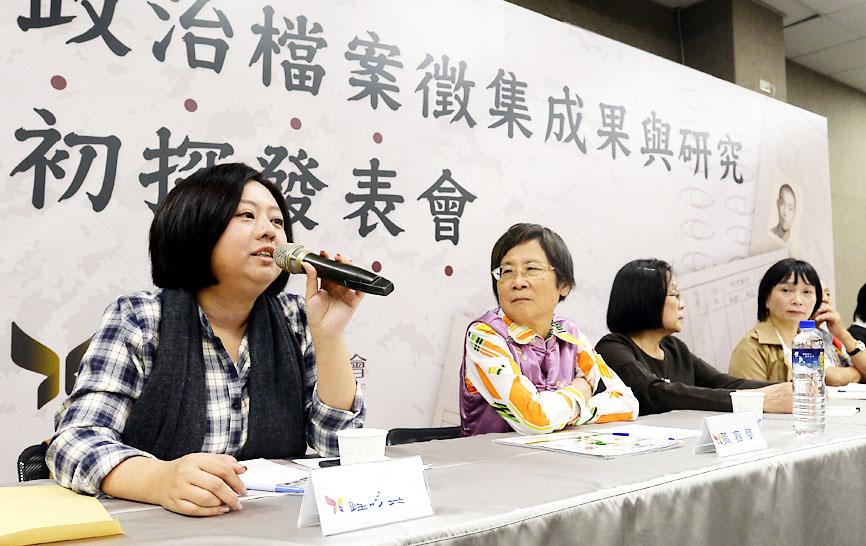The Transitional Justice Commission yesterday presented a sixth batch of declassified Chinese Nationalist Party (KMT) records at a forum in Taipei, with the contents showing abuse of power and violations of human rights extending up until the year 2000.
The batch contained 77,000 files, mainly records of citizens targeted by the KMT, Commission Chairwoman Yang Tsui (楊翠) said, adding that most of them came from the archives of the Taiwan Provincial Police Division, the forerunner of the National Police Agency.
“This forum focusing on the secret surveillance of family members of suspected political dissidents and communist sympathizers during the White Terror era shows that they monitored the entire family, even after the victim was executed or imprisoned,” Yang said.

Photo: Lin Cheng-kung, Taipei Times
Commission researcher Chen Yu-chi (陳昱齊) said that the records indicated that the KMT government had at most in one year placed 15,000 citizens under constant surveillance, and that figure later decreased to about 8,000 to 7,000 in a year.
Besides the Taiwan Provincial Police Division, the other agencies in KMT’s surveillance network included the Taiwan Garrison Command, the Ministry of Justice’s Investigation Bureau, the Political Warfare Bureau and the KMT Central Committee’s mainland China affairs department, Chen said.
The KMT’s surveillance network constantly monitored people suspected of being political dissidents or communist sympathizers up until Chen Shui-bian (陳水扁) of the Democratic Progressive Party was elected president in 2000.
The family of Chung Hao-tung (鍾浩東) attended the forum. Chung was a high-school principal who was arrested and tortured in 1949 on suspicion of being a communist, and later sentenced to death and executed in October 1950.
Chung’s granddaughter, Chung Yin-chen (鍾吟真), said that almost all of her family and their friends were monitored by the KMT, as the list of names took up three pages in the records and even included a friend who only visited her father a few times.
“My father’s elder brother began farming in a remote mountain village, and they put him under surveillance. The KMT’s state apparatus clearly used huge resources ... to monitor suspected political dissidents,” she said. “Their methodology was to show no mercy, to kill 100 innocent people in order not to miss one real guilty person.”
Huang Wen-gong (黃溫恭), a dentist in Kaohsiung’s Lujhu District (路竹), was executed by firing squad in May 1953 under direct orders from then-president Chiang Kai-shek (蔣介石) because he was suspected of being a communist.
His oldest daughter, Huang Ling-lan (黃鈴蘭), said: “I recently saw the declassified file on my father and my family. It was quite a shock to find that they had placed me under constant surveillance after had I reached the age of 18, and it had very detailed records on me.”
Huang Wen-gong’s second daughter, Huang Chun-lan (黃春蘭), said: “I came to attend this forum, and took the Taipei subway system which passed by the Chiang Kai-shek Memorial Hall Station, a monument dedicated to an evil dictator. When will justice prevail? When will the government make changes to this memorial?”

The Central Election Commission has amended election and recall regulations to require elected office candidates to provide proof that they have no Chinese citizenship, a Cabinet report said. The commission on Oct. 29 last year revised the Measures for the Permission of Family-based Residence, Long-term Residence and Settlement of People from the Mainland Area in the Taiwan Area (大陸地區人民在台灣地區依親居留長期居留或定居許可辦法), the Executive Yuan said in a report it submitted to the legislature for review. The revision requires Chinese citizens applying for permanent residency to submit notarial documents showing that they have lost their Chinese household record and have renounced — or have never

A magnitude 5.6 earthquake struck off the coast of Yilan County at 12:37pm today, with clear shaking felt across much of northern Taiwan. There were no immediate reports of damage. The epicenter of the quake was 16.9km east-southeast of Yilan County Hall offshore at a depth of 66.8km, Central Weather Administration (CWA) data showed. The maximum intensity registered at a 4 in Yilan County’s Nanao Township (南澳) on Taiwan’s seven-tier scale. Other parts of Yilan, as well as certain areas of Hualien County, Taipei, New Taipei City, Taoyuan, Hsinchu County, Taichung and Miaoli County, recorded intensities of 3. Residents of Yilan County and Taipei received

Taiwan has secured another breakthrough in fruit exports, with jujubes, dragon fruit and lychees approved for shipment to the EU, the Ministry of Agriculture said yesterday. The Animal and Plant Health Inspection Agency on Thursday received formal notification of the approval from the EU, the ministry said, adding that the decision was expected to expand Taiwanese fruit producers’ access to high-end European markets. Taiwan exported 126 tonnes of lychees last year, valued at US$1.48 million, with Japan accounting for 102 tonnes. Other export destinations included New Zealand, Hong Kong, the US and Australia, ministry data showed. Jujube exports totaled 103 tonnes, valued at

BIG SPENDERS: Foreign investors bought the most Taiwan equities since 2005, signaling confidence that an AI boom would continue to benefit chipmakers Taiwan Semiconductor Manufacturing Co’s (TSMC, 台積電) market capitalization swelled to US$2 trillion for the first time following a 4.25 percent rally in its American depositary receipts (ADR) overnight, putting the world’s biggest contract chipmaker sixth on the list of the world’s biggest companies by market capitalization, just behind Amazon.com Inc. The site CompaniesMarketcap.com ranked TSMC ahead of Saudi Aramco and Meta Platforms Inc. The Taiwanese company’s ADRs on Tuesday surged to US$385.75 on the New York Stock Exchange, as strong demand for artificial intelligence (AI) applications led to chip supply constraints and boost revenue growth to record-breaking levels. Each TSMC ADR represents